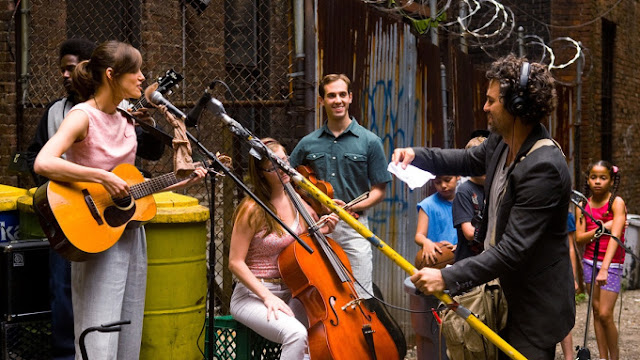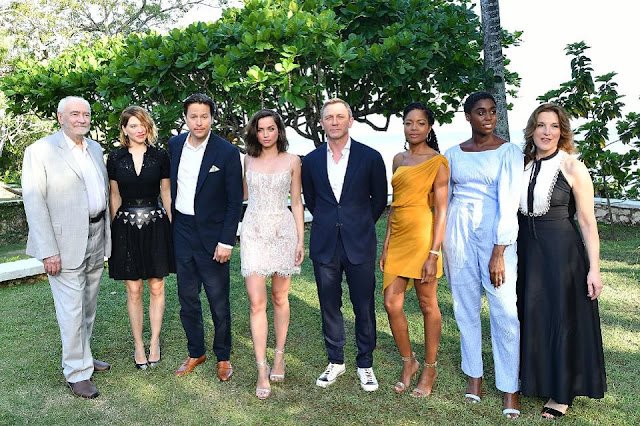The Best Films Treat All Their Characters With Respect
The best screenwriters are the ones that treat all their characters with the same respect, crafting movies that allow the audience to empathise with and understand all the characters by giving them a voice
 |
| Keira Knightley and Mark Ruffalo in 'Begin Again' (CREDIT: EntertainmentOne) |
by Jack Linsdell
Movies, especially spurred on by the blockbuster phenomena of the last few decades, have become very prejudiced or biased towards the side of moral/social/political "good". By that, I mean that most screenplays, especially for our biggest action/sci-fi/superhero flicks, have the "good guys/girls" who are morally pure and completely heroic, and our antagonistic characters who are explicitly "bad" people who are just there to create conflict. The problem is this. No one is explicitly "good" as we all have flaws and bad sides, and no one can be completely "bad" either, or at least there is emotional/societal subtext which has turned/forced them into having a "bad" personality. So, movies are not only becoming more clichéd, but are actually depicting humans who are most unlike us.
Sometimes, this is because the writer has forgotten that being a hero is not about being completely "pure" of heart, and often because they have very little respect for all their characters. Some writers treat their antagonistic characters as being one-dimensional "bad" people, giving them very little motive, emotional arc or context to explain why they are acting that way. And, when you lose sight of your characters, and don't treat everyone of them with the same respect, you have a problem.
So, without getting too technical, there are two movies from the last decade that are most notable for treating every character (whether their antagonistic or not) with the same respect by giving them a voice. Firstly, we have John Carney's 2013 musical/family-drama Begin Again, which uses a non-linear narrative style (out of chronological order for those unaware) to show how every one of it's characters has their flaws and emotional conflicts to solve. The movie starts with Keira Knightley's Gretta, a struggling songwriter dealing with a cheating boyfriend and a failed relationship, singing one of her melancholic songs in a bar. We see Mark Ruffalo's depressed and suicidal music producer drinking away in the same bar, and then approaching her with a very forward/sexist/offensive demeanour after trying to sign her. Our impression of him is that he's an antagonistic character, because we're seeing him from Gretta's perspective, and we know that his offensive personality is really clashing with Gretta, who we've followed through the ups and downs of her relationship up till this point. As the story progresses, we see the same bar scene again but from Ruffalo's POV, after following him through being fired by his own record company and conflicting relationship with his ex-wife and their promiscuous teenage daughter. Now, seeing the same scene again, we understand why he was behaving in such an offensive manner before, actually feeling sympathy for him. What Crowley cleverly crafts in his Keira Knightley/Mark Ruffalo/Hailee Steinfeld/Catherine Keener/James Corden/Adam Levine-led musical-drama, is a three-dimensional domestic drama in which the audience understands and sympathises with every character, especially those that at first appear antagonistic. Even Adam Levine's portrayal of the cheating boyfriend is given explanation and a "I'm truly sorry" arc to give him a motive for his actions.
Another movie that followed Begin Again, is Stephen Chbosky's Julia Roberts/Owen Wilson/Jacob Tremblay-led family drama Wonder released to critical acclaim in 2017. Although based on a book by R. J. Palacio, what Chbosky and co-writers Jack Thorne and Steven Conrad so sublimely craft is a compelling and emotionally charged family-domestic drama, but one which treats all it's characters with the respect they deserve, especially those who appear antagonistic at the start. The film flitters between the different perspectives of it's leading characters (much like the novella Frankenstein for those literature fans out there), although our main story follows 'Auggie' Pullman (a ten-year-old with a medical facial deformity whose being bullied at school) and his sister Olivia 'Via' (a teenage struggling with the loss of her best friend and a lack of attention/care from her parents), we also get the see the perspectives of why Auggie's best friend (Jack Will) betrayed him, why Via's best friend Miranda abandoned their friendship, and finally are even placed alongside Auggie's bully Julian to see his redemption. The point is, Chboksy and co. successfully create a movie where we have a lot of respect, emotional connection and relatability to/for all of our main characters, regardless of whether they've been mostly antagonistic throughout the film. This deepens the entertainment value and moral fulfilment an audience gets from the movie because it's clear that the writers loved every single one of their characters. The, quite unique but masterfully executed, switching perspectives turns what could have been a conventional "bad guys pick on the good guys" bullying themed high-school drama into a rich, deep and layered domestic drama in which every character has by the end earned our sympathy and respect.
An honourable mention is also this year's Isabelle Huppert/Chloe Grace Moretz-led thriller Greta, in which screenwriter/director Neil Jordan so masterfully gives Huppert's antagonistic psychopathic old woman an emotional-themed motive that allows the audience at the very least to understand why she's behaving in such a dark and out of control way. It's her isolation that causes her to take Chloe Grace Moretz's character hostage in her house, and even if the audience doesn't "like" Greta, at least Jordan has deepened your entertainment value in the film by allowing you to understand why and where she's coming from.
So, if there's one lesson to be learned from Begin Again, Wonder and this year's Greta, then it's that the most successful and fulfilling movies are the ones that give every character a voice by treating everyone of them with the same level of respect. By at the very least, allowing even the most antagonistic characters a "why I'm like this" emotional arc, the audience can empathise and understand the story in a much more deeper and compelling way. And, as a screenwriter myself, it's a real treat to watch movies where the writer's so obviously love every single one of their characters the same way. If you are a parent to several children, you love them all the same, regardless of whether one of them is out-of-control. It should be the same for writers and their children (characters).


Comments
Post a Comment